In Roger Stone case, anything can happen
By Elie Honig
Updated 8:44 PM ET, Tue January 29, 2019
Elie Honig, a former federal and state prosecutor, is a CNN legal analyst and a Rutgers University scholar. The views expressed in this commentary are his own. View more opinion articles on CNN.
(CNN)Special counsel Robert Mueller's indictment of Roger Stone sparked an avalanche of viewer and reader comments this week. To some, the Stone indictment proves that the Trump campaign coordinated illegally with Wikileaks and Russian hackers to cheat in the 2016 election. To others, the indictment establishes merely that an eccentric hanger-on committed a "process" crime (lying to Congress) about his unsuccessful efforts to puff himself up within the campaign by making predictions about the Wikileaks publication of hacked emails.
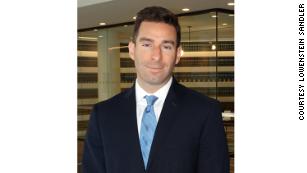
Put me in the first group. While Mueller has charged Stone with lying to Congress but not conspiracy charges, we know that every word Mueller puts in the indictment (1) is backed by hard proof and (2) matters. Based on the Stone indictment, we now know that "senior Trump Campaign officials" -- note the "senior" and note the plural -- urged Stone to coordinate with Wikileaks regarding the timing and manner of the public release of hacked emails. There is room to argue about the larger significance of these facts and to contemplate the interstitial details, but, as Kevin Bacon's Captain Jack Ross states in "A Few Good Men," these are the facts of the case, and they are undisputed.
This week's most commonly asked question: why hasn't Mueller charged Stone or others with larger conspiracy crimes based on coordination between the Trump campaign and Wikileaks, and what specific crimes might he charge? I see several federal crimes that could apply to the facts as we now know them: (1) conspiracy to solicit, accept or receive a campaign contribution or donation -- the hacked emails, which held significant value, being the contribution or donation -- from a foreign national; (2) conspiracy to engage in computer hacking -- construing the conspiracy broadly to include dissemination of the hacked emails, following the model from Mueller's Russian intelligence indictment and (3) conspiracy to defraud the United States, under the same theory Mueller used to charge Russian social media trolls and Russian intelligence agents who hacked the DNC and other Clinton-related emails in the first place.
As to why Mueller has not charged these offenses yet, there are two only possibilities: either he doesn't believe he has the evidence, or he does and more charges are forthcoming against more people. Given the specific and damning allegations in the indictment, I do not see Stone being the only person who goes down for this.
On Tuesday, Stone pleaded not guilty in court and said he believes "this is a politically motivated investigation."
Also this week, acting Attorney General Matthew Whitaker announced that Mueller's investigation is "close to being completed." Read on below for my response to a reader question, in which I explain why Whitaker made a rookie-level tactical mistake and why "close to being completed" doesn't mean the same thing as "near the end."
We were also reminded that mafia references are never far from the Mueller/Trump/Russia front. Stone allegedly invoked a character from "The Godfather" in his effort to intimidate a witness from testifying in Congress. And Trump and Giuliani used the time-tested mob tactic of threatening family members to keep a potential witness silent, publicly reminding Michael Cohen that his father-in-law might face consequences if Cohen testified. Meanwhile, Paul Manafort continues to careentoward sentencing that could keep him behind bars the rest of his life, while Congress prepares to hear from Cohen and Whitaker.
Now, your questions
Carla: (Mueller) says a senior Trump campaign official "was directed" by somebody to contact Stone. What is the significance of these words from Mueller?
More Sharpie ink was spent circling Paragraph 12 of the Stone indictment than any other: after a June 22, 2016 release of stolen emails by Wikileaks, "a senior Trump Campaign official was directed to contact Stone about any additional releases and what other damaging information (Wikileaks) had regarding the Clinton Campaign." Mueller conspicuously uses the passive voice here -- the senior campaign official "was directed" by some unnamed person rather than some unnamed person "directed" the senior campaign official.
Typically, prosecutors in an indictment will only use the full name of the defendant; everybody else gets a generic label like "Individual-1" or "Person-1" or "Candidate-1." So, two questions arise. One, did Mueller use this unusual passive voice construction to avoid naming the person giving the direction, specifically or generically (and if so, what person is worth doing a dance around)? Two, who would have been in a high enough position to "direct" a "senior" campaign official? The universe of people who answer both these questions is small.
Kragar: Wouldn't Stone have to be found guilty in a trial before a pardon could be offered? Wouldn't accepting of a pardon then mean Stone could be compelled to testify and not be allowed to take the Fifth?
No, a person does not have to be convicted (or even charged) before being pardoned. Gerald Ford pardoned Richard Nixon, who had not been convicted or even charged with a crime in 1974. Jimmy Carter pardoned Vietnam War draft dodgers as a group, many of whom had not been charged or convicted in 1977.
On the second question, a person who has been pardoned generally could not invoke the Fifth Amendment to remain silent (the rationale being, if a person can't be convicted, how can he have a right against self-incrimination?). However, a recipient of a presidential pardon might claim that he has continuing exposure under state laws -- which generally lie beyond the scope of a presidential pardon -- thereby justifying an invocation of the Fifth Amendment. State authorities might, in turn, choose to immunize the witness to get his testimony, which then would leave the witness with no choice but to testify.
Mike: Based on the available information, what is the sentencing guidelines calculation for Stone?
General tip: never be "wowed" by the total amount of punishment a person faces. It's easy to take the maximum penalties for every count in an indictment, add them up and come up with some jaw-dropping total (for Stone, 50 years). Virtually nobody ever gets the total maximum penalty on any given count, and multiple counts are usually combined rather than stacked on top of one another for sentencing purposes.
The more relevant issue is the sentencing guidelines range. This range -- which is influential but not binding on the sentencing judge -- is based on the defendant's prior criminal history and the seriousness of the charges of conviction. Here, based on my calculation, Stone is looking at 24 to 30 months for lying to Congress if convicted at trial, or 15 to 21 months if he pleads guilty. The kicker could be the witness tampering charge, which could up the range to 41 to 51 months after trial, or 30 to 37 months with a plea. However you slice it, Stone is looking at a long stretch behind bars.
Craig: What would be the likely timing of a (Stone) trial?
In federal courts, there is a "speedy trial" rule requiring that trial occur within 70 days of indictment. But that 70 number is largely illusory because the parties can and almost always do agree to delay it. As a practical matter, federal trials do happen fairly quickly, particularly where the court recognizes a pressing public interest. For reference, Mueller indicted Manafort in the Eastern District of Virginia in February 2018, and trial began in late July and carried into August 2018. Five to six months to trial seems like a reasonable estimate for Stone as well. Who's up for another summer courtroom drama?
William: So, all of these Trump associates have been indicted for lying and/or obstruction. Why the lies? What exactly are they hiding? Are the lies and obstruction methods of preventing Mueller (from) discovering Trump campaign efforts at collusion?
Responding to Stone's indictment, Giuliani said, "Another false statement case? God almighty." Two important points about perjury cases. First, lying to Congress (or federal agents or prosecutors) is a crime in itself, as we've seen in the cases against Manafort, Cohen, Michael Flynn, George Papadopoulos and others.
Second, people simply do not lie for no reason. While people at times lie for noncriminal reasons, often they do so because they are hiding something. As such, the law recognizes a concept called "consciousness of guilt," which reflects the commonsense notion that lying can be evidence of a guilty state of mind. Judges instruct juries that they may use a defendant's lies to conclude that the defendant knew about, and knew he was guilty of, other crimes. So, take a critical eye to efforts by Giuliani or others to dismiss charges as "process crimes" or mere false statements cases. The obvious question such charges raise is: what was this person lying about, and why? While people at times lie for noncriminal reasons, most often they are hiding something.
Christina: Can Giuliani be charged with witness intimidation?
Many readers asked about Trump and Giuliani's statements suggesting Cohen's testimony might somehow endanger his father-in-law. Let's put aside Trump, because Department of Justice policy counsels against indicting a sitting president. Unfortunately for Giuliani, that protection does not extend to the sitting president's lawyer. The legal bar for witness tampering is low: it's afederal crime to use intimidation, threats or corrupt persuasion to "influence, delay or prevent" testimony.
In normal criminal cases, defense attorneys routinely announce publicly that the cooperating witness is a liar and a scoundrel and will be destroyed on cross-examination.
However, Giuliani's threats go further. First, by invoking Cohen's family members, Giuliani -- beyond taking an unseemly page right from the same mafia families he used to prosecute -- appears to threaten consequences outside the courtroom. Second, Giuliani's client is the President of the United States, who is uniquely situated as head of the Executive Branch to make an investigation of Cohen's father-in-law a reality.
Bottom line: Giuliani's statements about Cohen's family are terrible form and likely criminal under the strict letter of the law. But Mueller is unlikely as a practical matter to charge Giuliani, given the dicey appearance of trying to take out the President's chief defender in the middle of an unfolding investigation.
LaVel: Regarding Whitaker's announcement that Mueller's investigation is "close to being completed," any thoughts about this?
With five minutes left in last week's AFC Championship game, the Chiefs led the Patriots, 21-17. At that point, it would have been entirely accurate to describe the game as "close to being completed." A wild back-and-forth scoring frenzy ensued before the Patriots prevailed 37-31. The point is that in criminal investigations -- like in football -- even when it's almost over, the most important developments often happen in the endgame.
It's crucial to understand that criminal investigations do not typically have a clear, finite finish line. Even investigations that are fully closed often have to be reopened; look no further than former FBI Director James Comey announcing to the world in 2016 that the Clinton email investigation was closed, only to reopen it weeks later based on new developments.
Focusing on Mueller, at a minimum, we know that cooperation from Rick Gates and Flynn is ongoing; that Manafort, Flynn and Gates still need to be sentenced; and that the entire Stone case needs to play out. And that's without even accounting for the possibility of additional indictments, which could well be in play, as discussed above.
On top of all that, no matter what Mueller does, and no matter what happens in the criminal courts, we will have Mueller's report to the attorney general and perhaps Congress, with the attendant legal and political fallout. And leaders of the newly-Democratic House have made clear they intend to use their subpoena power to conduct robust factfinding, whether or not Mueller is finished. So, while Mueller may indeed be close to wrapping up, don't head for the exits just yet; the most interesting parts lie ahead.
Stay up to date...
However close we are to the end, Whitaker made a dazzlingly poor tactical decision by announcing that Mueller is almost finished. I've been involved in thousands of cases and never seen a prosecutor announce publicly that an investigation was almost done. This is for good reason: it tips the hand of the investigators and gives potential targets a tactical advantage. If targets or witnesses know a prosecutor is under time pressure to wrap up, they will have good strategic reason to slow-play, to drag their feet, to wait it out.
For example: Mueller and Giuliani have been in long-running negotiations over an interview of Trump. If Giuliani knows Mueller is almost done, then he knows it's unlikely Mueller will be willing to go to court over a prolonged subpoena fight. That gives Giuliani a tactical advantage and gives him more reason to reject any offer for a voluntary interview. I don't know if Whitaker made the announcement out of incompetence or for some other reason, but I really hope it's just that he screwed up and not something worse.
Got a question? Reach out to @eliehonig on Twitter or by email to CNN.Opinion@turner.com. Your question may be published along with your name.
Three questions to watch for next week:
1) Despite his public protestations, might Stone consider cooperating, now that he is looking down the barrel of a seemingly airtight Mueller indictment that could land him behind bars for much of his remaining life? (And if he did, could we call him a "rolling Stone"?)
2) Will Trump pardon Stone, and if so, will he do it early in the proceedings, or wait to see how things play out?
3) What developments will we see as the Mueller investigation enters the all-important endgame?
end quote from:
https://www.cnn.com/2019/01/29/opinions/roger-stone-case-anything-can-happen-honig/index.html

















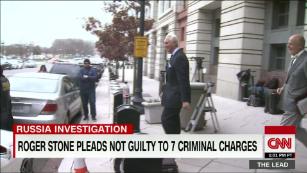
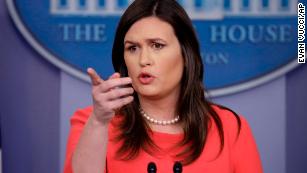
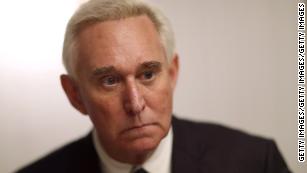
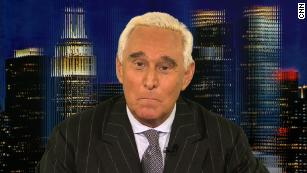
No comments:
Post a Comment